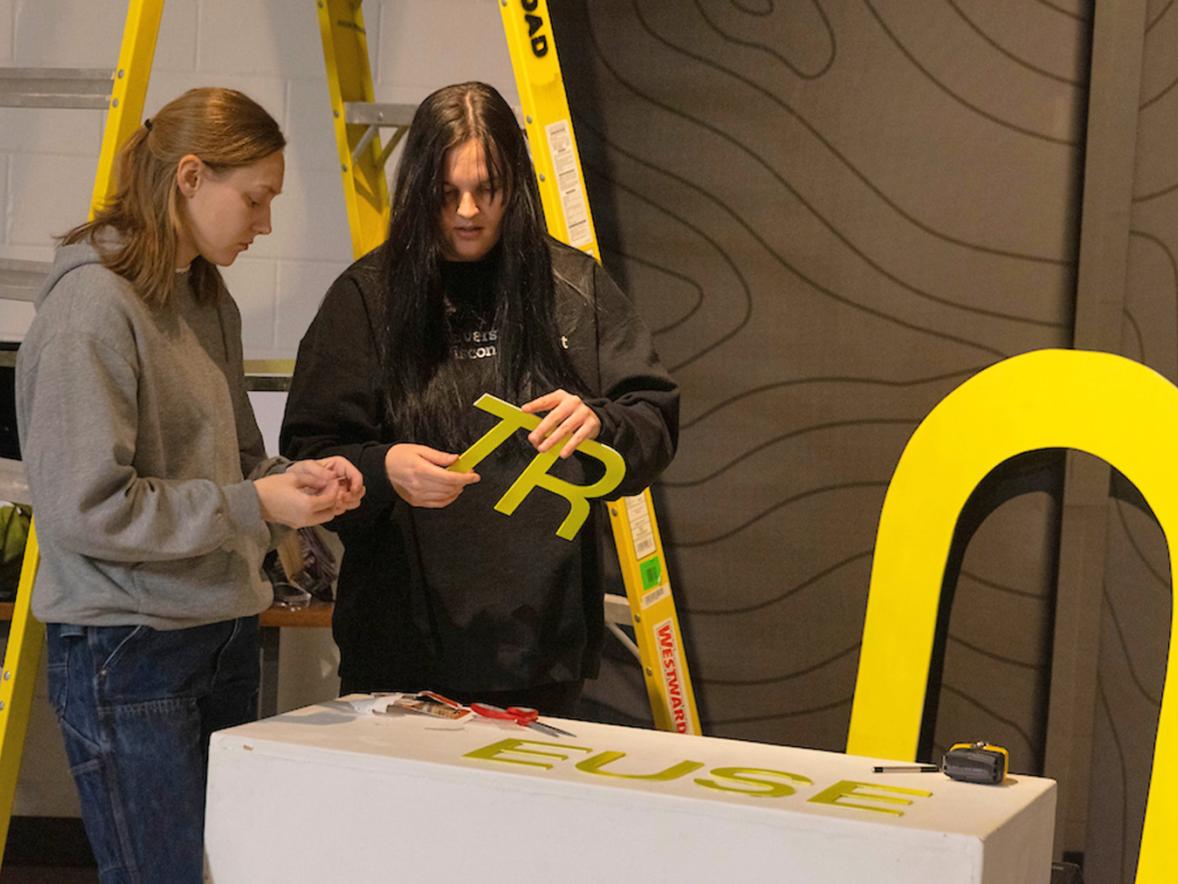More than 200 University of Wisconsin-Stout faculty and students will share their research, scholarly and artistic works at the upcoming Research Day from 9 a.m. to 5 p.m. on Tuesday, May 3, in the Memorial Student Center Great Hall and ballrooms.
The annual event features posters, oral presentations and visual art displays, representing graduate and undergraduate programs from across the university. The schedule is:
- 9 to 11 a.m.: WiSys Quick Pitch, a fun competition where students persuasively describe their research in three minutes.
- 12 to 3 p.m.: Poster exhibition demonstrating the works of faculty and students.
- 1 to 2 p.m.: Award ceremony and reception celebrating faculty and student Outstanding Researchers.
- 2:30 to 5 p.m.: Twenty-minute oral presentations by faculty and graduate students.
- Virtual presentations will be held from Monday, May 2, to Friday, May 6, on Canvas.
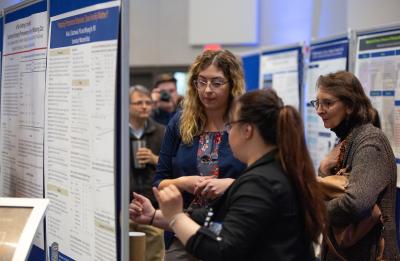
Community members and employer partners are invited to attend both the in-person event and virtual presentations. Student work, as well as catering for the event, is supported by the Stout University Foundation.
This is the first time Research Day is being offered in a hybrid format.
“The benefits to students who participate in research are many, including enhanced student learning, increased retention, increased enrollment in graduate education and effective career preparation,” said Anne Hoeltke, director of the Office of Research and Sponsored Programs.
“The dissemination of student and faculty research at Stout’s Research Day supports our pedagogical approach and allows students and faculty to communicate their research, transfer their knowledge and raise awareness about their learning, all while inviting audience engagement, participation and feedback.”
Provost Glendalí Rodriguez believes, “Research Day is a celebration of learning, curiosity and cross-disciplinary community building for our campus. I am Stout Proud of the work and of all of the researchers.”
Research and development in the medical device industry
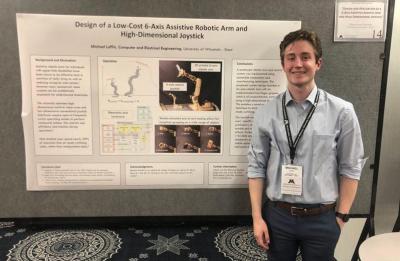
Michael Laffin, a senior in the computer and electrical engineering program, recently participated in another research event, the Showcase of Design of Medical Devices Conference in Minneapolis.
Laffin presented his project “Design of Low-Cost 6-Axis Assistive Robotic Arm and High-Dimensional Joystick” in a poster exhibition at the conference's student showcase.
He began his research 19 months ago as a personal project, working in his home, motivated by an interest in robotics and medical technology.
“I am interested in working in research and development within the medical device industry as a career,” Laffin said. “I believe it is an exciting field that can be uniquely rewarding. I think that the current low cost and accessibility of electronics and electrical engineering knowledge places CEE as one of the most exciting, impactful and rewarding STEM disciplines.”
Laffin’s intent was to produce a low-cost, fully capable robotic arm for an individual with severe upper limb disabilities. The device would be capable of enabling and amplifying every day grasping and manipulation efforts through the robot, while resolving existing limitations of efficiency and intuition within commercial systems, he explained.
He built a prototype using 3D printing, an accessible manufacturing technique, and released the technical documentation online, including a full bill of materials and components required to build the system, as well as photos and videos of the manufacturing and assembly processes.
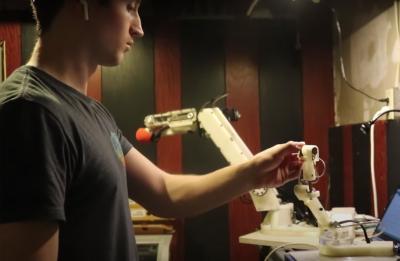
“The robot is designed to be mounted to a mobile wheelchair and can move in any direction and orientation to grasp and manipulate a wide variety of objects,” Laffin said.
“The faculty in my department have been very helpful in allowing me to pursue this project independently as the focus of my required capstone course.”
Professor Ahmet Turkmen thinks Laffin is one of the most exceptional students he has met in his 30 years of teaching. “Michael is academically a perfect student. He is very excited to learn engineering, math, science and related topics,” Turkmen said. “He is committed to being a very good engineer and scientist. His project can be an excellent support for people with certain types of disabilities.”
In 2019, Laffin was part of a team of UW-Stout students awarded the RESNA Student Design Challenge, an annual competition that showcases creative and innovative assistive technology designs to help people with disabilities live more independently. Their project, ATOM: Adaptive Tongue Operated Mouse, is a mouth- and tongue-operated mouse for those who are paralyzed or have ALS to help them use a computer.
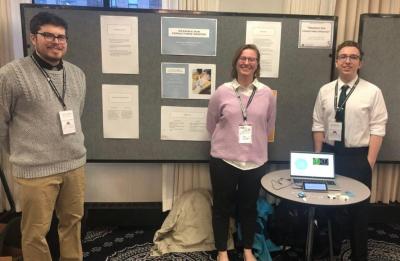
Also attending the DMD conference were CEE students Allison Haack of Mishicot; Daniel Ivankovic of Eau Claire; and Alek Siegel of Spencer, who presented their project “Wearable Skin Conductance Sensor for Monitoring Stress.”
They developed a noninvasive system to monitor variations in skin resistance caused by perceived physical exertion, fear of suffering a fall or other injury during an activity, and enjoyment or pain levels associated with each exercise performed, Turkmen explained.
“Relating the variations in skin resistance associated with exercise may enable researchers to develop novel medical diagnosis and monitoring devices,” he said.
The project was sponsored by Dr. Jeff Leismer, CEO and founder of VibeTech Inc., which offers safe, accessible physical therapy and occupational therapy to people with impaired physical mobility.
Turkmen and Leismer have been friends for 20 years. “Since I joined Stout in 2007, Jeff has sponsored many capstone projects for our computer and electrical engineering students,” Turkmen said. “The students are working hard to complete the project, get data from real people and get meaningful results.”
Laffin thinks attending conferences has numerous benefits, including offering networking opportunities with judges and reviewers who are often academic or business leaders eager to connect with new talent.
“I found the DMD conference and others to be a source of technical insight as well,” he said. “Publishing in such a conference not only helps to validate your abilities as an engineer but also helps establish and develop the name and reputation of UW-Stout.”
Laffin, of Spring Valley, graduates on Saturday, May 7, and will begin his graduate studies in the electrical and computer engineering department at UW-Madison this fall.





